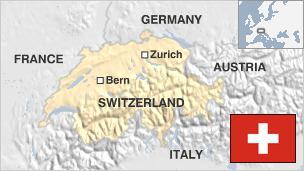Switzerland profile

A landlocked, mountainous country, Switzerland's geographical position in central Europe and studious neutrality have given it the access and political stability to become one of the world's wealthiest countries, largely through its banking industry.
Formally neutral since just after the Napoleonic wars of the early 19th century and informally for about 300 years before that, Switzerland joined the United Nations only in September 2002. Surrounded by the European Union, it is gradually engaging more closely with its powerful neighbour and other international organisations.
Although it lies close to the geographical centre of Europe, and most of its trade is with its European neighbours, it is not an EU member. A referendum in 2001 went against opening talks on joining.
Membership of the European Economic Area was also rejected by referendum in 1992 and Swiss-EU relations are now based on an extensive range of bilateral agreements.
 Much of Switzerland's wealth is based on it's banking sector
Much of Switzerland's wealth is based on it's banking sector
At a glance
- Politics: Switzerland has a collective head of state, the Federal Council. Each year, a council member is chosen to fill the post of Federal President. Referendums are central to the political system of direct democracy
- Economy: Switzerland is a centre of global wealth. Investors use its banks as a safe haven from world financial turmoil. Banking secrecy is a cornerstone of the industry, but has come under fire outside Switzerland
- International: Formally-neutral Switzerland joined the UN in 2002. It remains outside the EU, but is in the passport-free Schengen zone
Country profiles compiled by BBC Monitoring
Ties became closer in 2005 when a referendum backed membership of the EU Schengen and Dublin agreements, bringing Switzerland into Europe's passport-free zone and increasing cooperation on crime and asylum issues. A further referendum the same year opened the job market to workers from the 10 newest EU member countries.
At the same time Switzerland has been gradually acceding to international pressure to allow greater scrutiny of its famously secretive banking sector, amid growing concerns about money-laundering and the financing of terrorist groups.
The country forms a European cultural and linguistic crossroads, with about two-thirds of the population speaking German, around one-fifth French and about 7% Italian. Romansch, the fourth national language, is spoken by less than 1% of the population.
The people are given a direct say in their own affairs under Switzerland's system of direct democracy, which has no parallel in any other country.
They are invited to the polls several times a year to vote in national or regional referendums and people's initiatives. Constitutional proposals and major international treaties must be put to the vote, and parliamentary decisions can be subjected to a vote by collecting 50,000 signatures.
The tradition of a citizen army, seen as an essential part of Swiss neutrality, runs deep. During the Cold War the Swiss maintained one of Europe's largest land-based armies. The extremely costly militia system, under which every adult male was conscripted and remained in the reserves until middle age, has been slowly streamlined.
The government expressed its regrets over the country's behaviour in World War II following a report by an independent panel of historians on Swiss relations with the Nazis. The report found that the authorities had known what lay in store for the Jewish refugees to whom they closed their borders in 1942, and had assisted the economy of Nazi Germany, although not to a degree that prolonged the war.
 Swiss scenery includes fertile meadows, spectacular Alpine peaks as well as mountain lakes
Swiss scenery includes fertile meadows, spectacular Alpine peaks as well as mountain lakes


 Greek PM to reveal new cabinet
Greek PM to reveal new cabinet Syria jet pilot defects to Jordan
Syria jet pilot defects to Jordan Art of rejection
Art of rejection The cult of TED
The cult of TED Changed by Bali
Changed by Bali Through a lens
Through a lens Alan Turing: Man and myth
Alan Turing: Man and myth Talking Movies
Talking Movies